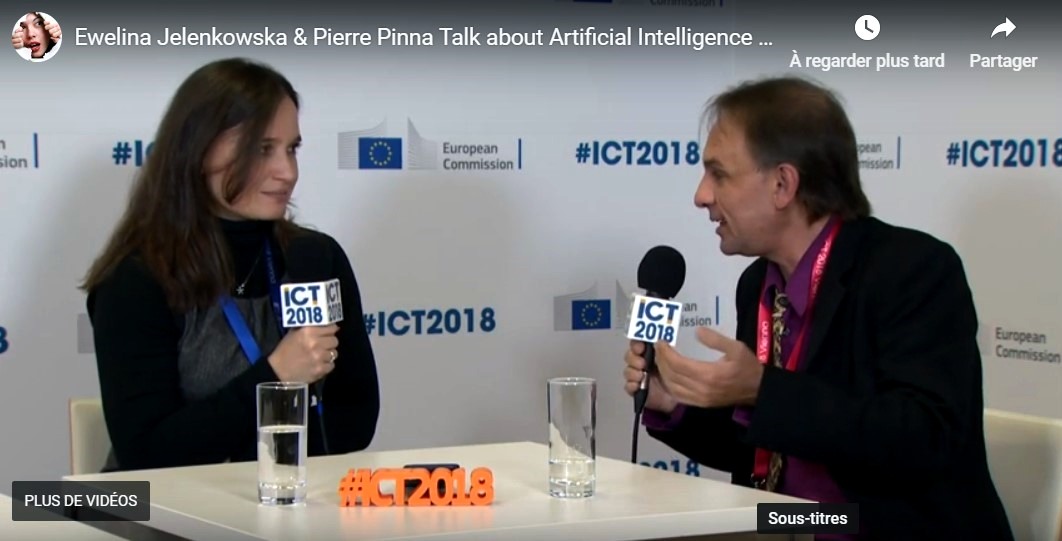The European Commission is today presenting a plan prepared with the Member States, to encourage the development and use of Artificial Intelligence in Europe.
With investment levels for AI in the EU being low compared to other parts of the world, such as the United States and China, the plan provides for increased coordination of investments, which will increase synergies and invest at least €20 billion in public and private investment in AI research and innovation by the end of 2020 and more than €20 billion per year over the next decade.
And, crucially, closer and more effective cooperation between the Member States, Norway, Switzerland and the European Commission will be essential for the development and deployment of advanced, ethical and safe AI. Priority is given to areas of public interest such as health care, transport, mobility, safety and energy.
Let’s now identify the 4 main axes to be retained, but before, let’s check this great talk I had with Ewelina Jelenkowska (Head of Communication at the European Commission for Digital Transformation) at the ICT 2018 Event in Vienna, where she explains that the EU will help developing an ethical #AI for the benefits of all. (Video in French with English subtitles).

Click here to see the video and thanks Ewelina for your professionalism and your kindness.
Discover now the four main axes of the new European Commission plan for AI:
- Maximizing investments through partnerships
Joint actions to achieve the investment objectives mentioned above, also include support for collaboration between academia and industry in Europe.
The Commission will also support young companies and innovators in the field of artificial intelligence and blockchain as well as companies in their expansion phase, for example through the creation of world-class European centres of excellence in AI.
- Creating European data spaces
Large, secure and robust data sets must be available for AI technology to be developed. In collaboration with European countries, the Commission will create common European data spaces to facilitate cross-border data sharing, while ensuring full compliance with the general data protection regulation. The health sector can particularly benefit from AI: in coordination with Member States, the Commission will support the development of a common health database to improve, for example, cancer diagnosis and treatment using AI technology.
- Fostering talent, skills and lifelong learning
EU countries face a shortage of AI specialists.
That is why the Commission, in collaboration with European countries, will support the creation of higher education diplomas in artificial intelligence, for example through specialised study grants. The Commission will also continue to support digital skills and lifelong learning for society as a whole, and in particular for those workers most affected by AI. Finally, for the development of a human-centred AI, it is also important that AI is present in the educational programmes of other disciplines, such as law for example.
- Developing an ethical and trustworthy AI
AI raises new ethical issues, such as potentially biased decision-making. In order to create the confidence necessary for companies to accept and use AI (it is indeed important to work on explaining the decisions taken by entities driven by deep learning and its famous “black blox”), the European plan aims to develop a technology that respects fundamental rights and ethical rules. A European group of experts, representing academia, business and civil society, is currently working on the development of ethical guidelines for the development and use of AI. The experts will present their final version to the Commission in March 2019 after extensive consultation through the European AI Alliance. The ambition is then to bring Europe’s ethical approach to the world stage and for this reason, the Commission opens cooperation to all third countries that are willing to share the same values.
More details here on the EU website: http://europa.eu/rapid/press-release_IP-18-6689_en.htm







![The Incredible Growth of Fintech [Infographic]](http://ipfconline.fr/blog/wp-content/uploads/2018/02/31-01-2018-growth-of-fintech-1-218x150.jpg)
![FINE LIST OF 50 TOP WORLD BIG DATA EXPERTS TO FOLLOW IN 2017 [WITH MOZ SOCIAL SCORE]](http://ipfconline.fr/blog/wp-content/uploads/2017/05/Capture0000001ALTERN-218x150.jpg)

![FINE LIST OF 30 TOP WORLD INSURTECH EXPERTS TO FOLLOW IN 2017 [WITH MOZ SOCIAL SCORE]](http://ipfconline.fr/blog/wp-content/uploads/2017/05/hgfhfh1-218x150.jpg)














Artificial Intelligence is one of the transformative forces of our times and is becoming a highly important topic for policy agendas of the governments and international organizations……… This is why diplomats need to invest in the understanding of technology!